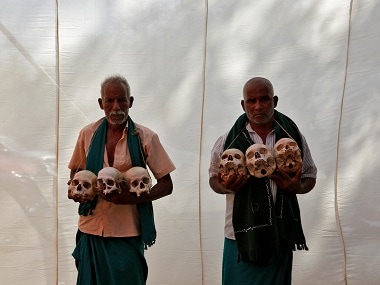Vipul Vivek As the impact of the worst northeast monsoon in 140 years unfolds across Tamil Nadu, farmers sowed a third less land than they did in 2015-16, water levels in six major reservoirs continued to plunge, and suicides in the farm sector increased over five years. In the midst of this agrarian turmoil in a state that produced 5.6 percent of India’s rice in 2014-15, the agriculture ministry has predicted a record national harvest. [caption id=“attachment_3445390” align=“alignleft” width=“380”]  File photo of the Tamil Nadu farmers protests. Reuters[/caption] Tamil Nadu has reported 29 percent year-on-year drop in overall crop sowing till 2 February, 2017, according to the latest situation report from the agriculture ministry. The retreating northeast monsoon—usually unnoticed in India owing to the singular importance of the larger southwest monsoon—in 2016 was the worst ever over the last 140 years, according to Indian Meteorological Department (IMD) records, since 1876, as IndiaSpend reported in January 2017. Record-keeping began in 1871, but a worse northeast monsoon, which sweeps across Tamil Nadu, coastal Andhra Pradesh, south interior Karnataka and Kerala, between October and December, was recorded in 1876, making 2016 the year of the second-worst monsoon in 145 years.
Source: Department of Agriculture Cooperation & Farmers Welfare; Data as of February 2, 2017
Water levels in three of six major Tamil Nadu reservoirs monitored by Central Water Commission dropped 25-70 percent between 5 January and 11 May, 2017, according to the commission data, even as the average across the six reservoirs was 82 percent less than normal for the week ending May 11, 2017. There are no official data on what percentage of Tamil Nadu farms are irrigated using water from the state’s 78 reservoirs.
Source: Central Water Commission data for January 5, 2017 and May 11, 2017
As the drought–officially declared as such on
January 10, 2017–rolls on, the state government has told the Supreme Court it is not linked to suicides by farmers, a contention disputed by a representative of farmers in New Delhi, where a
protest is drawing international attention, as protesters display what they say are the skulls of dead farmers. Farm suicides not because of drought: State government The Tamil Nadu government’s
claim that only 82 farmers have committed suicide since October 2016 is wrong, P Ayyakannu–one of the representatives of Tamil Nadu farmers in Delhi and Tamil Nadu president of Desiya-Thennindhiya Nathigal Inaippu Vivasayigal Sangam (National-South Indian Rivers Interlinking Farmers Association)–told IndiaSpend. He claimed that over 400 farmers had killed themselves because of reasons attributable to the drought and police reports about these suicides had been filed. IndiaSpend could not independently verify this claim.
Source: Accidental Deaths & Suicides in India reports 2010, 2011, 2012, 2013, 2014 & 2015Note: Farm sector includes those who till their own land or someone else’s as well as agricultural labourers. For the years 2010-13, figures are those reporting farming/agriculture under self-employment.
The Supreme Court, in a hearing on 8 May, 2017, refused to intervene in the matter of compensation to the families of farmers who died in the wake of drought following the state’s worst monsoon in 140 years, the farmers’ counsel, N Rajaraman, told IndiaSpend. Ayyakannu has challenged the state government’s submission to the Supreme Court that farmer suicides were not because of drought. The Supreme Court bench, comprising Justices Dipak Misra and AM Khanwilkar, on being informed that 20 cases of farmer suicides in the past year or so have been reported to district collectors, advised Rajaraman to bring those to the notice of the high court instead of the Supreme Court. The Supreme Court had said on 3 May, 2017, that it was interested in the structural aspects of minimum support prices and mandis (local markets). The Supreme Court seemed reluctant to get involved in the more pressing issue of compensation, Rajaraman told IndiaSpend. S Panneerselvam, Professor and Head, Agro Climate Research Centre, Tamil Nadu Agriculture University, Coimbatore, told IndiaSpend that they would be issuing an advisory based on the first forecast in April 2017 by the India Meteorological Department of the southwest monsoon as normal. The forecast will be updated in June. (Vivek is an analyst with IndiaSpend.)


)

)
)
)
)
)
)
)
)



